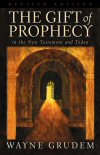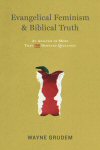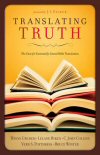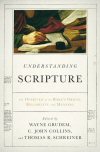Crossway Wayne Grudem Collection (5 vols.)
Digital Logos Edition
Overview
Wayne Grudem is a widely renowned New Testament scholar, theologian, and research professor. This collection gathers together some of his key works from the 21st century on prophecy, evangelical feminism, Bible translation, and more. With clarity and charity, Grudem cuts through these potentially divisive topics and inserts wit, wisdom, and common sense—all rooted in biblical teaching.

Key Features
- Features key texts from a distinguished biblical scholar
- Roots discussion of complex topics in biblical revelation
- Addresses key themes and idea in contemporary evangelical debate
Product Details
- Title: Crossway Wayne Grudem Collection
- Author: Wayne Grudem
- Publisher: Crossway
- Volumes: 5
- Pages: 1,904
- Resource Type: Monographs
- Topic: Theology, Biblical Studies, Apologetics
Individual Titles
- The Gift of Prophecy in the New Testament and Today
- Evangelical Feminism and Biblical Truth: An Analysis of More Than 100 Disputed Questions
- Evangelical Feminism: A New Path to Liberalism?
- Translating Truth: The Case for Essentially Literal Bible Translation
- Understanding Scripture: An Overview of the Bible’s Origin, Reliability, and Meaning

What does the New Testament teach about the spiritual gift of prophecy? What is it? How does it function? Can evangelical Christians use it in their churches today? This updated, comprehensive work answers such questions and points the way to a renewed understanding of the gift of prophecy—an understanding that suggests how the body of Christ may enjoy one of the Holy Spirit’s most edifying gifts without compromising the supremacy of Scripture.

What does the Bible really teach about the roles of men and women? Bible scholar Wayne Grudem carefully draws on 27 years of biblical research as he responds to 118 arguments often levied against traditional gender roles. Grudem counters egalitarian and feminist critiques with clarity, compassion, and precision, showing God’s equal value for men and women while celebrating the beauty in their differences.
The major strength of this work is that it engages with the best egalitarian writing over the past twenty years. This is a massive work which is unique in its breadth and detail.
—Sharon James, Evangelical Quarterly
Though the [book’s] contents reflect Grudem’s commendable scholarly research and clear thinking, he also presents the material in an extraordinarily well-organized format and in highly readable prose. . . . Grudem proves masterful in his refutation of the arguments [of egalitarianism]. Yet, he maintains an unusually irenic and charitable spirit in so doing, for which he is to be commended. . . . [This book] should be read by anyone who wants to understand both Scripture and the current debate on this theme. I highly recommend this new volume by Dr. Grudem as the appropriate follow-up to and extension of the discussion in the earlier volume, Recovering Biblical Manhood and Womanhood.
—Richard L. Mayhue, research professor of theology, The Master's Seminary
Impressive. . . . Leaves no stone unturned. Grudem deals with every question imaginable that is connected with the biblical texts on the topic from Genesis 1 to 1 Timothy 2. . . . In all cases Grudem tries to argue in the best way possible, taking into account the most recent research and literature on each topic. . . . The book is meant to be used as a reference book when looking for answers to a specific argument in the debate.
—Jürg Buchegger, Evangelical Review of Theology

By critically examining the writings of egalitarians, Grudem shows that, while egalitarian leaders claim to be subject to Scripture in their thinking, what is increasingly evident in their actual scholarship and practice is an effective rejection of the authority of Scripture.
Egalitarianism is heading toward an Adam who is neither male nor female, a Jesus whose manhood is not important, and a God who is both Father and Mother, and then maybe only Mother. The common denominator in all of this is a persistent undermining of the authority of Scripture in our lives. Grudem’s conclusion is that we must choose either evangelical feminism or biblical truth. We can’t have it both ways.
Biblical authority is at stake in the debate between complementarianism and egalitarianism—because if you can get egalitarianism from the Bible, you can get anything from the Bible. The weight of Grudem’s cumulative argument is considerable, and cannot easily be dismissed.
—J. Ligon Duncan, chancellor and CEO, Reformed Theological Seminary, Jackson, Mississippi
While authors and scholars sympathetic to egalitarianism may be loath to consider they may in fact be wrong, Grudem pleads with his readers to reconsider their positions.
—Michael Easley, pastor, Fellowship Bible Church, Brentwood, Tennessee
Wayne Grudem exhibits faithfulness to the biblical revelation and courage in the light of near universal opposition. There is not a more important book to read on the subject than this one.
—Paige Patterson, president, Southwestern Baptist Theological Seminary

In an age when there is a wide choice of English Bible translations, the issues involved in Bible translating are steadily gaining interest. Consumers often wonder what separates one Bible version from another. The contributors to this book argue that there are significant differences between literal translations and the alternatives. The task of those who employ an essentially literal Bible translation philosophy is to produce a translation that remains faithful to the original languages, preserving as much of the original form and meaning as possible while still communicating effectively and clearly in the receptors’ languages.
Translating Truth advocates essentially literal Bible translation in an attempt to foster an edifying dialogue concerning translation philosophy. It addresses what constitutes “good” translation, common myths about word-for-word translations, and the importance of preserving the authenticity of the Bible text. The essays in this book offer clear and enlightening insights into the foundational ideas of essentially literal Bible translation.

Why is the Bible trustworthy? Does archaeology confirm what the Bible says? How do I interpret the Bible? The Bible is the most important book in the world. But questions like these puzzle believers and unbelievers alike. Editors and scholars Wayne Grudem, C. John Collins, and Thomas Schreiner recognize the challenge we all face and offer this volume to help us properly understand the Bible.
Covering a diverse range of essential subjects, including how to read the Bible well and why it is reliable, these 18 essays delve into specific topics such as world religions, canon, and archaeology. Pastors, lay leaders, students, and other Christians engaged in studying God’s Word will benefit from this collection, written by notable contributors, including J.I. Packer, John Piper, Daniel B. Wallace, and Vern Poythress.
Useful as both a general overview of the Bible and as a tool for more specific reference and training, this book will help you grow in your understanding of Scripture and your ability to apply the Bible to life.
About Wayne Grudem
Wayne Grudem is research professor of theology and biblical studies at Phoenix Seminary, having previously taught for 20 years at Trinity Evangelical Divinity School. Grudem earned his undergraduate degree at Harvard University, as well as an MDiv from Westminster Seminary. He is the former president of the Evangelical Theological Society, a cofounder and past president of the Council on Biblical Manhood and Womanhood, a member of the Translation Oversight Committee for the English Standard Version of the Bible, the general editor of the Politics according to the Bible: A Comprehensive Resource for Understanding Modern Political Issues in Light of Scripture, and has published over 20 books, including Christian Beliefs: Twenty Basics Every Christian Should Know, Business for the Glory of God: The Bible’s Teaching on the Moral Goodness of Business, 1 Peter: An Introduction and Commentary, and Biblical Foundations for Manhood and Womanhood.